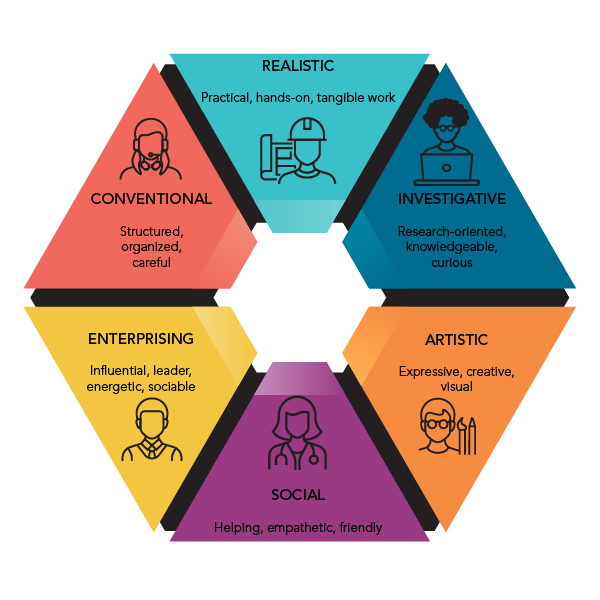Work Interests and the Holland Code

Six domains of the Holland code (Let's Talk Science)

Six domains of the Holland code (Let's Talk Science)
Students are introduced to the Holland Code framework and types of work interest themes. They are then challenged to identify their own career personality and occupational ideas.
Summary
- Students will engage in self-reflection and start to determine their top work interest themes or worker code (aka career personality).
- Students will develop new language to describe themselves and their future work preferences,
- Students will start to brainstorm occupational ideas or add to their list of occupational ideas.
Setting the Stage
Students are most familiar with their subject preferences, given their experience in school thus far (i.e., their current job title is “student”). They may have some ideas as to how they prefer to learn and what they prefer to learn. However, students may not have given much thought yet as to how they prefer to work. Knowing one’s work interests and worker type can support students in brainstorming and determining what occupations to explore, and help them assess which occupations may be best suited to them.
Materials & Preparation
-
Computer with internet access & projector or interactive whiteboard to show a YouTube video
-
What Are Their Work Interests? reproducible [Google doc] [Word doc] [PDF] - 1 per student (print or e-copy) . A Teacher’s Guide / Answer key is available for this reproducible [PDF]
-
My Work Interest Themes reproducible [Google doc] [Word doc] [PDF] - 1 per student (print or e-copy)
- Familiarize yourself with Work Interest Themes and Holland Code framework or theory (aka RIASEC theory of careers, career personality theory). See the Resources & References section below.
What To Do
Part A: Introducing the Holland Code
- Teachers could introduce students to the Holland Code framework and types of work interest themes using a video such as Holland’s Personality Types (5:07 min.), which provides a quick summary of the framework.

- Teachers should inform students that they may fit into all of the themes but often 2 or 3 are more relevant than the others.
- Teachers should encourage students to reflect on what their top theme areas might be while listening to the description of the theory and themes.
Part B: What are their work interests?
- To help students develop a deeper understanding of the characteristics of the various work interest themes, teachers could use the What Are Their Work Interests? Reproducible.
- For each of the three profiles, the teacher or a student volunteer will read aloud the “I am motivated by” statement.
- Teachers could then guide a class discussion and student reflection of the top work interest (Holland Code) themes for the profiled individual. Students should be able to provide a rationale and identify ‘why’ they feel the theme(s) is/are most appropriate. Refer to the Teacher’s Guide / Answer key for suggested responses.
Part C: Determining Work Interest Type / Top Work Interest Themes
- Teachers could have students complete one of the following work interest assessment options:
Part D: Exploring How Work interest Themes Match to Occupations
- Teachers could have students use one of the following tools to match their top themes to occupational titles:
Part E: Confirming Work Interest Themes Through Experience
- Working individually, with a partner or in small groups, students could brainstorm volunteer or work activities that can allow them to confirm and/or test out their potential work interest themes. For example, if students are “Social” they may want to explore or confirm this theme by choosing to work in a summer job as a camp counsellor, babysit or volunteer with patients at a health care facility. If students are “Conventional” they might volunteer to be the treasurer or secretary for a student club or get involved in organizing an event.
- Teachers could follow up this lesson with other career lessons such as the Testing the Waters and Mapping My Volunteer and Work Experience which focuses on gaining volunteer and work experience and being exposed to different careers.
Let’s Talk Science appreciates the work and contributions of Lisa MacPherson, University of Manitoba, in the development of this lesson.
Details
- Holland’s Theory (Updated 13 Aug 2019)
This article from the Government of New Zealand explains the six personality types found on the Holland Hexagon. It is worth noting that similar themes are placed adjacent to each other on the hexagon and differing themes are placed opposite to each other on the hexagon.
This tool from CareerInsite by Alberta’s alis website uses slightly different themes - 5 instead of 6. Loose correlations/connections to Holland Code are: Directive (Enterprising), Methodical (Conventional), Objective (Realistic), Social (Social), Innovative (Investigative). No Artistic theme represented in this framework.
- Teachers could assess student understanding of Work Interests and the Holland Code during the What are their work interests? whole class activity.
- Teachers could collect completed My Work Interest Themes Reproducibles for use as formative assessment. Students could include these in their career development portfolio.
-
What Are Their Work Interests? reproducible [Google doc] [Word doc] [PDF]
-
Teacher’s Guide / Answer key [PDF]
-
My Work Interest Themes reproducible [Google doc] [Word doc] [PDF]
Additional resources
- Holland’s Theory (Updated 13 Aug 2019)
This article from the Government of New Zealand explains the six personality types found on the Holland Hexagon. It is worth noting that similar themes are placed adjacent to each other on the hexagon and differing themes are placed opposite to each other on the hexagon.
This tool from CareerInsite by Alberta’s alis website uses slightly different themes - 5 instead of 6. Loose correlations/connections to Holland Code are: Directive (Enterprising), Methodical (Conventional), Objective (Realistic), Social (Social), Innovative (Investigative). No Artistic theme represented in this framework.
Assessment
- Teachers could assess student understanding of Work Interests and the Holland Code during the What are their work interests? whole class activity.
- Teachers could collect completed My Work Interest Themes Reproducibles for use as formative assessment. Students could include these in their career development portfolio.
Downloads
-
What Are Their Work Interests? reproducible [Google doc] [Word doc] [PDF]
-
Teacher’s Guide / Answer key [PDF]
-
My Work Interest Themes reproducible [Google doc] [Word doc] [PDF]